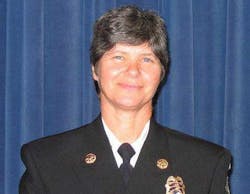New Charleston Fire Chief: Progress 'Unprecedented'
Becoming a fire chief is an accomplishment Karen Brack never imagined when she became a firefighter 30 years ago.
But her career took off. The Savannah native rose through the ranks in Fulton County, part of greater Atlanta, before becoming a deputy chief in Oregon.
She now leads the 314-member Charleston Fire Department. That isn't only a career peak: Brack is the first woman to become the city's fire chief, and the new job amounts to a sort of homecoming for the 55-year-old.
"It's both a professional and a personal achievement for me," Brack said Tuesday, her second day on the job. "I can't say I wanted to be a fire chief my first day as a firefighter. But as I hit every step, it became more and more real to me."
But Brack, who will make $137,000 annually, inherits a department beset in recent years by issues with antiquated practices and policy breaches, exposed since the Sofa Super Store fire that killed nine men in 2007.
Some of the same problems that arose after that blaze cropped up again in March 2011, when firefighters rushed into a commercial office building on Daniel Island with undersized hoses, no backup, no thermal-imaging camera and insufficient water. Their captain forgot his radio.
A commander managed to order them out minutes before the roof collapsed. No one was hurt, but a report issued earlier this year pointed out several policies that the crews violated.
But Brack said that wholesale reform in American fire departments typically happens over the course of five years and that Charleston's pace has exceeded that.
"It's unprecedented ... the amount of progress that the Charleston Fire Department made in addressing any issues and concerns that were brought forth in 2007," she said. "The men and women in this department have risen. They have done what they needed to do."
In introducing Brack to journalists Tuesday, Mayor Joe Riley touted one of the steps the agency has taken since 2007, including a five-agency pact that allows firefighters from neighboring communities to automatically respond to nearby incidents, regardless of jurisdiction. Authorities said the agreement will prevent some fires from growing and allow departments to handle multiple incidents simultaneously.
The hard-charging ethic that has stung the department in the past, both during the Sofa Super Store fire and the Daniel Island blaze, still has a place in the agency, but safety should be a top priority, Brack said. The aid agreement will help.
"We need to give every incident adequate resources," Brack said. "We want to get on it as quickly as we can, as aggressively as we can and as safely as we can."
Brack said she will focus on developing the fire marshal's office and handling workloads added by a new fire boat and hazardous-materials rig. But during a short interview with The Post and Courier, Brack stressed training as a priority.
In the Daniel Island fire, a commander hailed for ordering crews out of the building before it collapsed was promoted to battalion chief. But the promotion hinged on him earning his GED.
Brack cited training levels in the department: 99.6 percent of its sworn members have national fire certifications, and 40 percent are trained as paramedics.
"I would never say they haven't been trained adequately. They have," Brack said. "They're now at a certain level, and we'll maintain that level."
Brack becomes the fourth person to take the helm of the department in the five years since the Sofa Super Store blaze. Her selection resulted from a nationwide search that scrutinized 61 candidates.
The most recent permanent chief, Thomas Carr, took over in November 2008 and was credited with adopting more modern techniques and working to establish the mutual aid agreement.
Deputy Chief Frank Finley served as the department's interim leader after Carr's retirement and during the search for a new chief. As a member of the selection board, Finley said the choice was difficult, but Brack came out on top because of her background and the "honesty that she had" in answering panelists' questions. "I think she'll be here for a while," Finley said. "She'll keep us moving in the right direction and give us the stability we need."
Copyright 2012 The Post and Courier. All Rights Reserved

